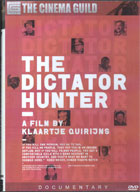
The Dictator Hunter 2007
Distributed by Cinema Guild, 115 West 30th Street, Suite 800, New York, NY 10001; 212-685-6242
Produced by Klaartje Quirijns
Directed by Klaartje Quirijns
DVD, color, 75 min.
College - Adult
African Studies, Human Rights, Law, Political Science
Date Entered: 05/29/2009
Reviewed by Michael J. Coffta, Business Librarian, Bloomsburg University of PennsylvaniaThis renowned film chronicles the endeavors of human rights activist and lawyer Reed Brody to bring accused dictators to trial. The film appropriately begins with Brody’s remark, “If you kill one person you go to jail … But if you kill 40,000 people, you get a comfortable exile with a bank account in another country.” Though Brody has set out to bring a number of criminals to justice, many of whom are being safeguarded by neighboring African nations, the film assigns a great deal of attention to Brody’s efforts regarding former Chad president Hissene Habre. Aided by the US and France in Chad’s war against Libya, Habre was deposed in 1990 and sought refuge in Senegal. Habre has been linked to thousands of murders, acts of ethnic cleansing, torture, and imprisonment. Throughout the film, the viewer is given poignant firsthand accounts of violence and abuse at the hands of African dictators, past and present. These victims are seen bringing their cases to statesmen, only to be discouraged by their inaction. Brody has also made great strides in organizing and mobilizing these victims. The audience sees Brody’s devotion, without sanctimony, and the amount of granular investigation undertaken in order to identify members of secret police and victims of atrocities.
This work has received global praise, and rightly so. It exhibits the resolve, frustration, heartbreak, and eventual satisfaction of this human rights crusader, all while demonstrating his sacrifices, strategies and tactics. Though one may rightly perceive this film to be an examination of the pursuit of dictators, it is also a lucid exploration of the national and international justice systems, the influence of the African Union, and, sadly, the influence of entrenched power.